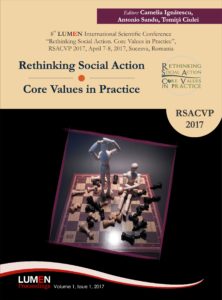Bringing RRI in Science Lessons – Challenges and Benefits for Students in Learning Process
Bringing RRI in Science Lessons – Challenges and Benefits for Students in Learning Process
Author(s): Laura Monica Gorghiu, Mihai Bizoi, Ana Maria Aurelia Petrescu, Gabriel Gorghiu
Subject(s): Essay|Book Review |Scientific Life
Published by: Editura Lumen, Asociatia Lumen
Keywords: interactive-participative teaching strategies; RRI; Science education; students’ opinion; ENGAGE project.
Summary/Abstract: Nowadays the mankind is facing more and more difficult problems concerning the environment and life quality that ask for more and more people involved to solve them. In this context, education has a special role to bring in attention the importance of Science knowledge in each individual’s development. Thus, there is very important to increase the students’ interest and motivation to learn more about the Science and Technology and how to this in their daily life. One of the new concepts introduced in Science education was Responsible Research and Innovation (RRI) with the hope that involving teachers and students in understanding the role of RRI dimensions we’ll obtain sustainable interactions between schools, research institutions, industry, governance and civil society organisations. It was proved that implementation of RRI principles in Science lessons enhance students’ engagement in solving different scientific problems, increase the critical thinking and develop their collaborative skills. Introducing the ethics and governance as RRI dimensions in students’ attention will develop their responsibility for solving the complex problems of our world. Due to these benefits, European Union decided to finance different projects to implement RRI in Science Education. One of those projects was the ENGAGE Project (“Equipping the Next Generation for Active Engagement in Science Equipping the Next Generation”, www.engagingscience.eu), developed in the frame of Seventh Framework Programme. This paper presents the students’ opinion obtained at the end of the ENGAGE project in Romania, during the ENGAGE RRI Festival held in Targoviste, on March 3rd, 2017.
Book: Rethinking Social Action. Core Values in Practice
- Page Range: 308-317
- Page Count: 10
- Publication Year: 2017
- Language: English
- Content File-PDF

